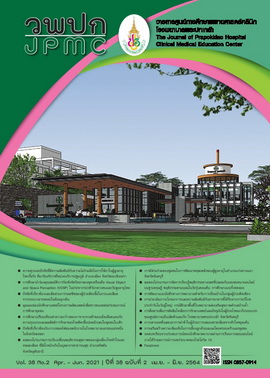Community Participation in The Development of Active Aging in Kaeng Hang Maeo Subdistrict, Chanthaburi Province
Main Article Content
Abstract
BACKGROUND: The elderly population is increasing around the world due to the lower birth rate and longer life expectancy. Thailand has been transforming into an aging society since 2005 and will reach this status in 2022. This research was conducted with the participation of the community for the active aging campaign, which included the health, social, security and service aspects for the self-sustained development of the elderly.
OBJECTIVES: To study the participation of development in the active aging campaign, improvement of the active aging index, and applicability of the active aging campaign.
METHODS: This study was a Participatory Action Research (PAR) and was conducted from January to October 2020. The sample comprised 30 participants in an elderly community in Kaeng Hang Maeo subdistrict. The provided activities included a medical check-up, exercise, growing vegetables and herbs, and visiting home. The data were collected from a focus group, pretest, post-test, and satisfaction evaluation. The percentage, mean, standard deviation, and paired sample t-test were analyzed.
RESULTS: To build community involvement in planning, activities were organized to develop the elderly and evaluate the results of the assessment. The active aging score means of the pretest and post-test were 3.6 and 4.0, respectively. The paired sample t-test showed a significant difference between the pretest and post-test (p < 0.001). The most impactful aspect was health, followed by social, service and security. The results of the satisfaction assessment and utilization: level were rated very good with an average of 4.6, and the elderly could use the knowledge they had received.
CONCLUSIONS: The participation of the active aging campaign improved the active aging index and quality of life.
Article Details
References
Institute for Population and Social Research,Mahidol University. Thai health report 2015. Nakhon Pathom: Amarin Printing and Publishing; 2016.
Fries JF. The theory and practice of active aging. Curr Gerontol Geriatr Res [Internet]. 2012 [cited 2020 May 5]; 2012:420637. Available from: https://www.hindawi.com/journals/cggr/2012/420637/
World health organization. Active aging, a policy framework. Madrid,Spain: WHO; 2002.
International Longevity Centre Brazil (ILC-Brazil). Active aging: a policy frame workin response to the longevity revolution [Internet]. 2015 [cited 2020 May 5]. Available from: http://ilcbrazil.org/news/active-ageing-a-policy-framework-in-response-to-the-longevity- revolution/
National Statistical Office. Active ageing index of Thai elderly. Bangkok: National Statistical Office; 2017.
Cohen JM, Uphoff NT. Participation’s place in rural development: seeking clarity through specificity. World Dev 1980; 8:213-5.
Gay LR. Education research: competencies for analysis and application. 6 th ed. New Jersey : Prentice Hall, Inc.; 1996.
Pumprawai A , Siengsanau J. Using community participation to improve health promoting behaviors among older adults. The Southern College Network Journal of Nursing and Public Health 2017; 4(3):160-75.
Piyasakulkiat O. Community participation in the development of the elderly quality of life of Thakhae sub-district Lopburi province. Rom Phruek Journal Krirk University 2018; 36(3): 46-65.
Somphu T. Develoment model of enhancing active aging for elder club in Thailand [dissertation]. Bangkok: Silpakorn University; 2017.
Rattanubol A, Phatumcharoenwattana V, Phatumcharoenwattana W, Kimpee P, Satjasopol R. Education and life long learning of the Thai elderly. Bangkok: Foundation of Thai Gerontology Research and Development Institute. 2011.
Robert Havighurst. The psychology of character development. Newyork: Wiley. 1960.
Wongprom J, Jongwutiwes K, Prasertsuk N, Jongwutiwes N. Community participation in the development of older persons’ quality of life. Veridian E-Journal, Slipakorn University. 2015;8(3): 41-54.
Zimmerman MA, Rappaport J. Citizen participation, perceived control, and psychological empowerment. Am J Community Psychol 1988;16:725-50.

